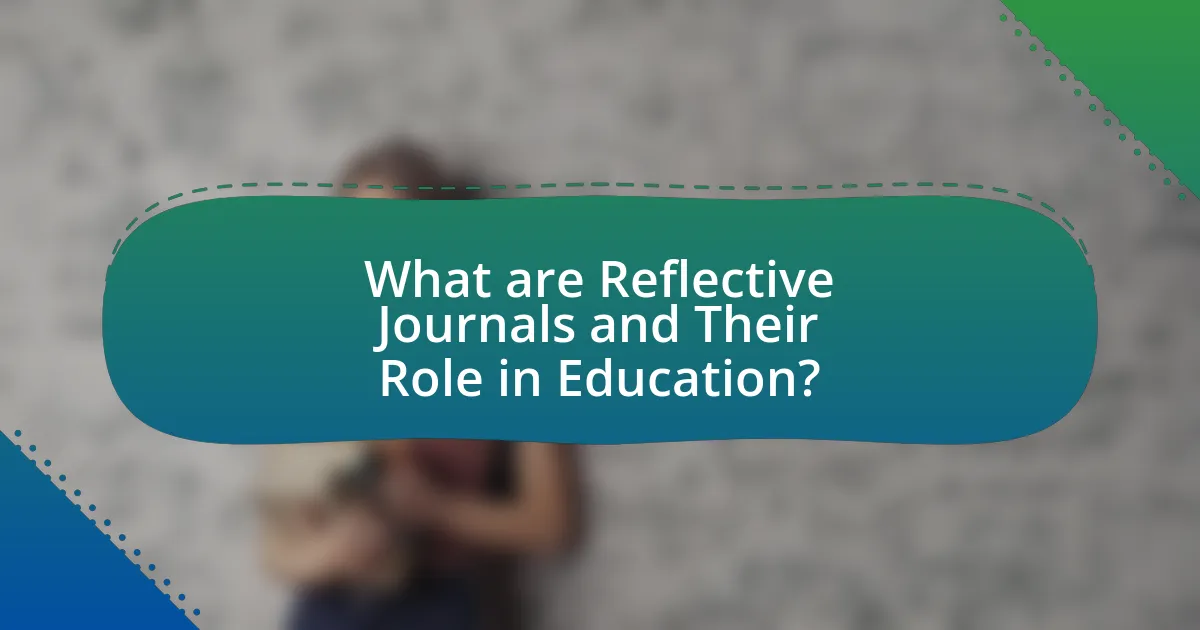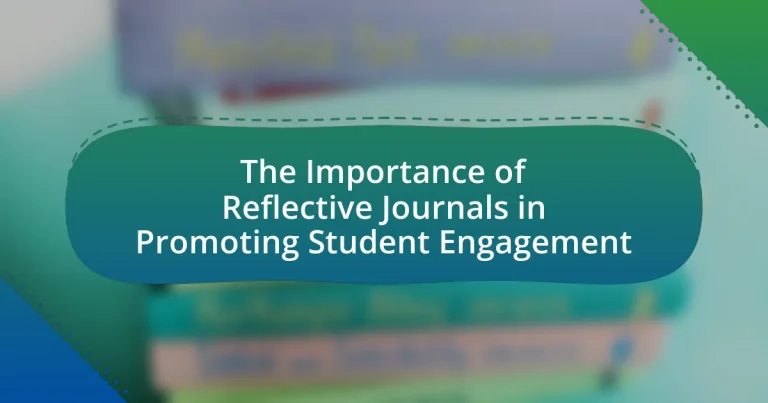Reflective journals are personal records utilized by students to document their thoughts, experiences, and learning processes, playing a significant role in enhancing critical thinking, self-awareness, and personal growth in education. This article explores how reflective journals improve student engagement and motivation, facilitate critical thinking, and develop essential skills such as communication and self-assessment. It also addresses effective implementation strategies for educators, the challenges students may face, and the long-term benefits of reflective journaling in fostering lifelong learning and preparing students for future challenges. Additionally, the article highlights best practices for integrating reflective journals into the classroom and resources available to support educators in this process.

What are Reflective Journals and Their Role in Education?
Reflective journals are personal records where students document their thoughts, experiences, and learning processes related to their educational activities. In education, these journals serve as a tool for enhancing critical thinking, self-awareness, and personal growth by encouraging students to reflect on their learning experiences and articulate their understanding. Research indicates that reflective journaling can improve student engagement and motivation, as it fosters a deeper connection to the material and promotes active learning strategies. For instance, a study by Moon (2006) highlights that reflective practices can lead to improved academic performance and greater retention of knowledge, demonstrating the significant role reflective journals play in the educational landscape.
How do Reflective Journals enhance student learning?
Reflective journals enhance student learning by promoting critical thinking and self-assessment. Engaging in reflective writing allows students to analyze their experiences, identify strengths and weaknesses, and develop a deeper understanding of the subject matter. Research indicates that students who regularly use reflective journals demonstrate improved academic performance and greater retention of knowledge, as they actively engage with the material and connect it to their personal experiences. For instance, a study published in the Journal of Educational Psychology found that students who maintained reflective journals scored significantly higher on assessments compared to those who did not, highlighting the effectiveness of this practice in fostering deeper learning.
What specific skills do Reflective Journals help develop in students?
Reflective journals help develop critical thinking, self-awareness, and communication skills in students. By engaging in reflective writing, students analyze their experiences, which enhances their ability to evaluate situations and make informed decisions. This process fosters self-awareness as students identify their strengths and areas for improvement. Additionally, the act of articulating thoughts in writing improves their communication skills, enabling them to express ideas clearly and effectively. Research indicates that reflective practices lead to deeper learning and greater academic success, as evidenced by studies showing improved problem-solving abilities and increased engagement in learning activities.
How do Reflective Journals facilitate critical thinking?
Reflective journals facilitate critical thinking by encouraging individuals to analyze their experiences and thoughts systematically. This process promotes deeper understanding and evaluation of personal beliefs and assumptions, leading to enhanced cognitive skills. Research indicates that reflective writing fosters metacognition, allowing students to assess their learning processes and outcomes, which is essential for critical thinking development. For instance, a study by Moon (2004) highlights that reflective journals help students articulate their reasoning and question their perspectives, thereby improving their analytical abilities.
Why are Reflective Journals important for student engagement?
Reflective journals are important for student engagement because they encourage active participation in the learning process. By writing in reflective journals, students articulate their thoughts, feelings, and insights about their learning experiences, which fosters deeper understanding and critical thinking. Research indicates that reflective practices enhance metacognitive skills, allowing students to evaluate their learning strategies and outcomes effectively. For instance, a study by Moon (2004) found that reflective journaling significantly improved students’ engagement and motivation by promoting self-awareness and personal growth. This evidence supports the assertion that reflective journals play a crucial role in enhancing student engagement.
What impact do Reflective Journals have on student motivation?
Reflective journals significantly enhance student motivation by fostering self-awareness and personal growth. When students engage in reflective journaling, they actively process their learning experiences, which leads to increased ownership of their educational journey. Research indicates that students who regularly utilize reflective journals report higher levels of intrinsic motivation, as they can connect their academic tasks to personal goals and values. For instance, a study by Moon (2006) found that reflective practices encourage deeper engagement with content, ultimately resulting in improved motivation and academic performance.
How do Reflective Journals promote self-awareness among students?
Reflective journals promote self-awareness among students by encouraging them to critically analyze their thoughts, feelings, and experiences. This practice allows students to identify their strengths and weaknesses, fostering a deeper understanding of their learning processes. Research indicates that engaging in reflective writing enhances metacognitive skills, which are essential for self-regulation and personal growth. For instance, a study published in the Journal of Educational Psychology found that students who maintained reflective journals demonstrated improved self-reflection and greater academic performance, highlighting the direct correlation between reflective journaling and self-awareness.

How can Reflective Journals be effectively implemented in the classroom?
Reflective journals can be effectively implemented in the classroom by integrating them into the curriculum as a regular assignment, encouraging students to write reflections after lessons or projects. This practice promotes deeper engagement with the material, as students articulate their thoughts and feelings about what they have learned. Research indicates that reflective journaling enhances critical thinking skills and self-awareness, as evidenced by a study published in the “Journal of Educational Psychology,” which found that students who maintained reflective journals showed a 20% increase in their ability to analyze and synthesize information compared to those who did not. Additionally, providing structured prompts can guide students in their reflections, ensuring they focus on specific learning outcomes and personal growth.
What strategies can educators use to encourage Reflective Journal writing?
Educators can encourage Reflective Journal writing by implementing structured prompts and regular feedback. Structured prompts guide students in their reflections, making it easier for them to articulate their thoughts and experiences. For instance, prompts can focus on specific learning outcomes or personal growth, which helps students connect their experiences to course content. Regular feedback from educators reinforces the importance of the journal, as it shows students that their reflections are valued and encourages deeper engagement. Research indicates that consistent feedback can enhance student motivation and improve writing skills, thereby fostering a more reflective practice.
How can prompts be designed to stimulate meaningful reflections?
Prompts can be designed to stimulate meaningful reflections by incorporating open-ended questions that encourage critical thinking and personal connection. Effective prompts often include specific scenarios or experiences that require students to analyze their thoughts, feelings, and actions, fostering deeper engagement with the material. Research indicates that prompts that ask students to relate concepts to their own lives or to consider alternative perspectives can significantly enhance reflective thinking. For example, a study by Moon (2004) highlights that prompts encouraging self-assessment and personal relevance lead to richer reflections and greater learning outcomes.
What role does feedback play in the Reflective Journal process?
Feedback plays a crucial role in the Reflective Journal process by enhancing the depth of student engagement and learning. It provides students with insights into their thought processes, helping them identify strengths and areas for improvement. Research indicates that feedback can significantly increase motivation and self-efficacy, as students feel more connected to their learning journey when they receive constructive input. For instance, a study by Hattie and Timperley (2007) in “Review of Educational Research” highlights that effective feedback can lead to a 30% improvement in student performance, demonstrating its importance in the reflective practice.
What challenges might students face when using Reflective Journals?
Students may face several challenges when using reflective journals, including difficulty in self-expression, time management issues, and lack of guidance. Self-expression can be challenging as students may struggle to articulate their thoughts and feelings effectively, which can hinder the reflective process. Time management issues arise when students find it hard to allocate sufficient time for regular journaling amidst their academic responsibilities, leading to inconsistent entries. Additionally, a lack of guidance from instructors on how to approach reflective journaling can result in confusion about expectations and objectives, making it harder for students to engage meaningfully with the practice.
How can educators support students in overcoming these challenges?
Educators can support students in overcoming challenges by implementing reflective journals as a tool for self-expression and critical thinking. Reflective journals encourage students to articulate their thoughts and feelings about their learning experiences, which can enhance their engagement and understanding. Research indicates that students who regularly engage in reflective writing demonstrate improved academic performance and emotional well-being, as it fosters a deeper connection to the material and promotes self-awareness. By providing structured prompts and feedback on journal entries, educators can guide students in navigating their challenges effectively, thereby enhancing their overall learning experience.
What common misconceptions exist about Reflective Journals?
Common misconceptions about reflective journals include the belief that they are merely diaries or that they require extensive writing skills. Reflective journals are not just personal diaries; they serve as structured tools for critical thinking and self-assessment, enabling students to analyze their learning experiences. Additionally, the notion that strong writing skills are necessary is incorrect; reflective journals prioritize thoughtfulness and insight over grammatical perfection, allowing all students to engage meaningfully. Research indicates that reflective journaling enhances learning outcomes by fostering deeper engagement and self-awareness, as noted in studies by Moon (2006) and Boud et al. (1985).

What are the long-term benefits of using Reflective Journals?
The long-term benefits of using reflective journals include enhanced critical thinking skills, improved self-awareness, and greater retention of knowledge. Reflective journals encourage individuals to analyze their experiences, leading to deeper understanding and the ability to apply learned concepts in various contexts. Research indicates that students who engage in reflective writing demonstrate higher levels of engagement and motivation, which can result in improved academic performance over time. For instance, a study published in the Journal of Educational Psychology found that reflective practices significantly enhance students’ ability to connect theoretical knowledge with practical application, thereby fostering lifelong learning habits.
How do Reflective Journals contribute to lifelong learning?
Reflective journals contribute to lifelong learning by fostering critical thinking and self-awareness in learners. Through regular reflection on experiences, individuals can identify their strengths and weaknesses, leading to improved decision-making and problem-solving skills. Research indicates that reflective practices enhance metacognitive skills, which are essential for continuous personal and professional development. For instance, a study by Moon (2004) highlights that engaging in reflective writing encourages deeper understanding and retention of knowledge, thereby reinforcing the learning process over time.
In what ways do Reflective Journals prepare students for future challenges?
Reflective journals prepare students for future challenges by enhancing critical thinking, self-awareness, and problem-solving skills. Engaging in reflective writing encourages students to analyze their experiences, which fosters a deeper understanding of their learning processes. Research indicates that students who regularly use reflective journals demonstrate improved metacognitive skills, allowing them to evaluate their strengths and weaknesses effectively. This practice not only aids in personal growth but also equips students with the ability to adapt to new situations and challenges in their academic and professional lives.
How can Reflective Journals influence students’ personal and professional growth?
Reflective journals significantly influence students’ personal and professional growth by fostering critical thinking and self-awareness. Engaging in reflective writing allows students to analyze their experiences, identify strengths and weaknesses, and set goals for improvement. Research by Moon (2006) indicates that reflective practices enhance learning outcomes by encouraging deeper engagement with course material and personal experiences. Furthermore, reflective journals serve as a tool for developing essential skills such as communication, problem-solving, and emotional intelligence, which are crucial for professional success. By regularly reflecting on their learning journey, students can cultivate a growth mindset, leading to continuous personal and professional development.
What best practices should educators follow when integrating Reflective Journals?
Educators should ensure that reflective journals are integrated with clear guidelines and structured prompts to facilitate meaningful reflection. Providing specific prompts encourages students to think critically about their learning experiences, which enhances engagement. Additionally, educators should regularly review and provide constructive feedback on journal entries, fostering a dialogue that deepens understanding. Research indicates that structured reflection can lead to improved academic performance and greater student satisfaction (Moon, 2006). Furthermore, creating a safe and supportive environment for sharing reflections promotes openness and honesty, which are essential for effective learning.
How can educators assess the effectiveness of Reflective Journals?
Educators can assess the effectiveness of Reflective Journals by analyzing the depth of student reflections, the frequency of entries, and the alignment of journal content with learning objectives. Evaluating the quality of reflections provides insight into students’ critical thinking and self-awareness, while consistent entries indicate engagement and commitment to the reflective process. Research shows that reflective practices enhance learning outcomes; for instance, a study by Moon (2006) highlights that structured reflection leads to improved academic performance and deeper understanding of course material. By using rubrics that focus on these aspects, educators can quantitatively and qualitatively measure the impact of Reflective Journals on student engagement and learning.
What resources are available to help educators implement Reflective Journals successfully?
Educators can successfully implement Reflective Journals by utilizing resources such as structured guidelines, training workshops, and digital platforms. Structured guidelines provide a framework for journal prompts and assessment criteria, ensuring consistency and clarity in expectations. Training workshops, often offered by educational institutions or professional development organizations, equip educators with strategies for integrating reflective practices into their teaching. Digital platforms, like Google Classroom or dedicated journaling apps, facilitate easy access and organization of student reflections, enhancing engagement and feedback. Research indicates that these resources significantly improve the effectiveness of reflective journaling in educational settings, fostering deeper student engagement and critical thinking skills.




